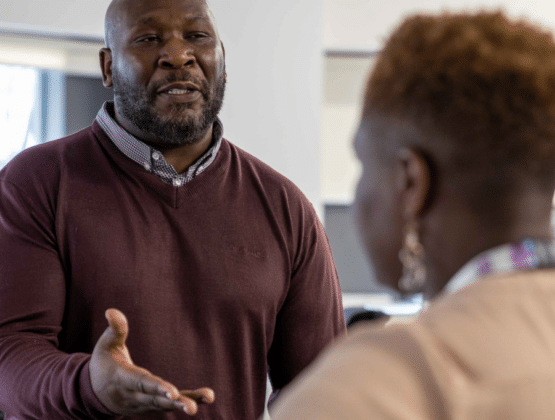Published by Skills for Justice
Why learning needs a human touch
Date 17.05.21

As we celebrate Learning at Work Week, the biggest festival of workplace learning in the UK, we reflect on the theme of this year’s awareness week ‘Made for learning’ and the three things which make us human; curiosity, learning and connecting.
“For somebody who was expelled from school for basically being an idiot, it is somewhat ironic that I found myself being asked to write a blog as a learning and development specialist. But according to the phrase ‘when the student is ready the teacher will appear’, I have found that my love of learning has grown exponentially through the pandemic. Indeed, I think it is very much an intrinsic part of who I am to want to find out more about what makes me tick, what are my passions, what are my strengths and how do I improve them, and what gets in the way of me achieving my personal and professional goals – arguably, my weaknesses.
“So being asked to reflect on the theme for Learning at Work Week this year has enabled me to reflect on what I have learnt and re-learned during the pandemic, and what the priorities are for us as individuals and our organisations as we move forward. The theme, Made for learning and the three things which make us human; curiosity, learning and connecting, acknowledges that humans are fundamentally ‘developers’: leave us alone and we pick up tools and objects, and make and learn things in order to master them – ultimately to help us survive and thrive. And this year’s challenges unlocked that primordial human nature.
“Following the disruption caused by the pandemic to formal programmes of learning, my own work has been impacted upon significantly: how we assessed learning, the activities we use for learning and the fact that our resources, particularly our human resources, have been subject to illness in many cases has provided a positive opportunity, though, to reassess our approach to L&D. It kind of reminds me of the athlete who picks up an injury – it is a good opportunity to reassess their training programme. So, the main things I have been reflecting on include:
- Our innovation and how we rapidly adapted to learning and development provision online as the only medium available for many of us
- The importance of digital skills in helping us learn and connect
- The fact that learning of the future now looks different than it did just two years ago
- The importance of Continuing Professional Development (CPD) for each of us
“In the first instance, I have been blown away by the speed at which some providers and organisations embraced digital media, as face-to-face sessions became impossible for most of us. This situation highlights several things that we need to focus on, such as our facilitation skills, which are very different online then face to face. This is because learner support, communication through body language, the use of presence and social learning, were all disrupted by having to work through online platforms. However, in turn, access to learning was promoted because it is more flexible (than having to travel to London for a half-day session), the use of recordings meant we had a permanent resource for reflection and we were able to review whether the learning was actually necessary or could be postponed, thereby saving money.
“The use of digital skills as a foundation for all employees is now apparently ‘non-negotiable’. Indeed, ‘I don’t do zoom’ will no longer be an option. And it is here that, as providers, we must make sure our skills and presentations are on point. Only last week I attended a half-day training session that was basically a ‘chalk and talk’ around a PowerPoint pack – not good enough in my opinion. There is no reason not to integrate learners through breakout activities, polling, message boards, and software that enables visual creativity. I think that organisations now have to build this into a minimum digital skills competency framework for all staff. If I had £1 for every time I have heard ‘I don’t know how to share my screen’, I would be rather wealthy by now.
“This migration to digital skills and online delivery also has significant impact for how we hold learning into the future. I do not believe it is acceptable to just push the learning out to participants and expect them to be expert self-developers. We all have a different level of self-awareness and we all need to be acutely aware of strategic aims of the learning and how it helps the business, plus we all need a motivational ‘nudge’ every so often. So, whilst it is true that ‘there is no blended learning now, only learning’, providers and organisations must provide facilitators, coaches and/or mentors, to help top and tail the learning programme so that we all, as individuals, can ensure we achieve the aims and standards. If we were all expert self-learners, there would be no need for learning and development departments…because we would have done it ourselves already.
“Finally, I am hearing regularly, from our clients and partners, my colleagues and thought leaders, the need for better CPD structures now. Why, for example, would health staff have a professional obligation for minimum annual CPD, whereas police officers, arguably, do not. Even if it is just honing our strengths, to go from good to great, it is a no-brainer that we all need to keep busy ‘being born’.
“Some of our organisations were already on their game when the pandemic landed. In our own organisation, I am pleased to say that we were already working significantly online as a learning provider and as an employer. We immediately set up an online facilitation skills programme for our deliverers, and our marketing team and events producers worked very closely with us to make sure we were offering a professional experience. Our communications have also increased in frequency and, arguably, we are much closer than we were before COVID-19 emerged, but we still believe that certain activities need holding – or at least top and tailing with expert support.
“I am convinced that our developmental programmes of the future (rather than content-led instruction activities) will incorporate a range of delivery mechanisms, including face-to-face. Where possible we must push transactional content out through digital media, such as rote learning, context material and certain learning activities. However, in my opinion, you cannot beat ‘a live show’ with a great trainer or facilitator, so I hope we do not dump all in-person connection. After all, I am human, curious, in need of connection and I love learning, albeit 36 years too late…”
Dr. Benedict Eccles is the Head of Consultancy Practice here at Skills for Justice and a chartered psychologist specialising in learning and organisational development. He currently oversees projects with policing organisations, Civil Service, Health Education England, NHS England and direct government bodies.
As well as being an associate Fellow of the British Psychological Association, he is a certified coach and a principal practitioner with the Association for Business Psychology, in both cognitive behavioural approaches to development and development through emotional intelligence.
Sign up to receive news and updates from Skills for Justice
"*" indicates required fields






